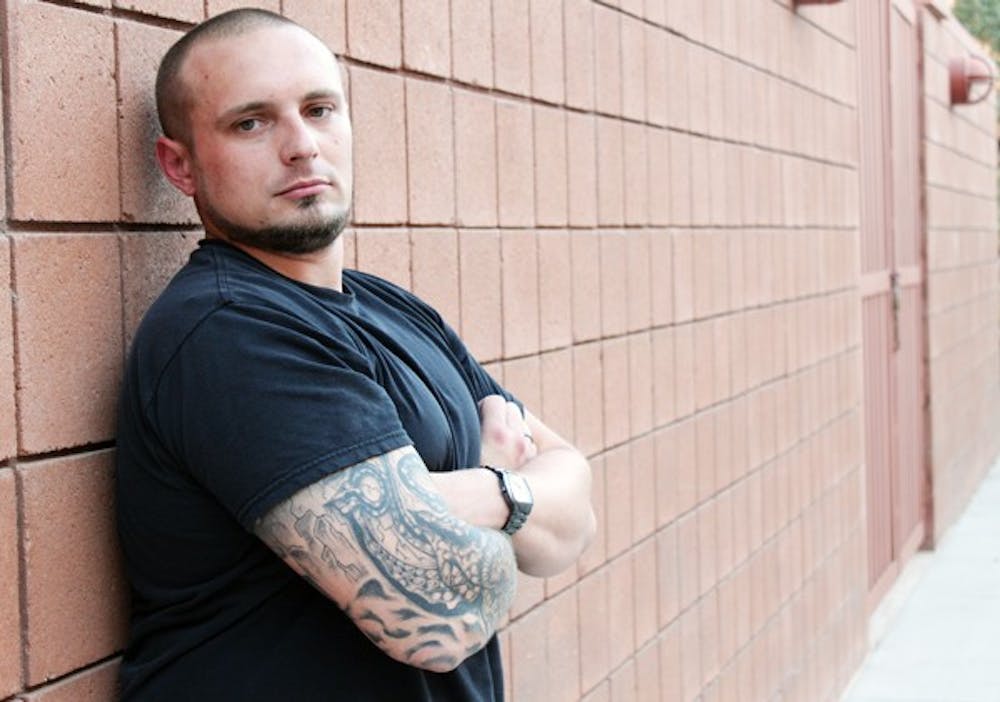Chris Gisriel is not your average student.
Appearance-wise, he doesn't look like the run-of-the-mill college student. His full-sleeve tattoos demand attention, which leads your eyes to a heavy metal band t-shirt. The only glimpse of his military past shows up as his buzz-cut.
What isn’t apparent on first glance is Gisriel’s old habit: He used to shoot heroin intravenously every day.
The biochemistry junior represents an often-silent population at ASU – students who are living in recovery from substance abuse.
When Gisriel returned home from his deployment in Afghanistan in 2005 he enrolled in Virginia Commonwealth University.
“It was funny, the reason I joined the military was to fix my life because it was pretty screwed up,” Gisriel said.
It didn’t work.
“Once I had all that money and all that freedom, I basically started shooting heroin, and I did that every day,” he said.
At 27, Gisriel has been clean for more than 4 years.
In an attempt to reach out to students in similar situations, he created Students for Substance Abuse Outreach, an ASU club that works to educate others looking for support about the existing recovery community in the Phoenix area.
“When we found out ASU didn’t have anything set up like that, we knew we could tap into that and at least give students enough information to help themselves if they wanted to,” Gisriel said.
SSAO has about 20 members and the club plans to start either a 12-step based meeting or recovery support group by Spring 2012.
“There are some hurdles that we have to jump through,” Gisriel said, adding that it has been difficult to find a room available at the same time every week.
“We are still navigating the system to make that happen.”
Deciphering how a university can support students in recovery can be difficult, Dean of College of Liberal Arts and Sciences Linda Lederman said.
Lederman served on the board of directors for the Association of Recovery Schools, which advocates incorporating recovery programs for students and families in both colleges and secondary schools.
Universities that already have a recovery program in place use the ARS as a benchmark to compare strategies with other schools, Lederman said.
ARS consists of 16 colleges spanning the nation that have implemented a recovery program within the school. These programs range from recovery housing, support groups to addiction classes.
ASU professor Michael Shafer directs research about the effectiveness of programs that provide support or treatment services to families and individuals with behavioral health problems, substance abuse issues or mental illness.
“We see that establishing a social support network that can support and provide recovery is critical,” Shafer said.
Everyone’s path is different, but plugging into the Alcoholic and Narcotic Anonymous fellowships around the Valley may be a beneficial launching point, he said.
Gisriel, who has been to treatment centers in the past, said that the crucial tool in helping him get clean was identifying with people that had first-hand experience with the issues he faced.
“I have never received much useful help from those people that were in positions that were superior to me, whether that was doctors, psychologists, psychiatrists, therapists and even from my parents or police,” he said. “That kind of stuff didn’t work for me.”
Today, Gisriel’s life is a sharp contrast from battling active addiction.
He just began work at one of ASU’s biochemistry labs, juggling his social and academic life, and is committed to helping others struggling with addiction.
“It’s really tough; sometimes I don’t know how I do it,” he said.
Even though ASU is recognized for its party scene, Gisriel said it is not difficult to avoid drugs and alcohol.
“The quality of my recovery points me in the direction of good people,” he said.
Gisriel said he dedicates his efforts to helping others find this same type of recovery.
“I never knew that happiness existed like I have it today,” he said.
Reach the reporter at lghuffer@asu.edu





